Entrepreneurship and Small Business Management: Post-Brexit
VerifiedAdded on 2020/06/05
|19
|5211
|65
Report
AI Summary
This report provides an overview of entrepreneurship and small business management, exploring different types of entrepreneurial ventures and their relation to typologies of entrepreneurship. It highlights the similarities and differences between various entrepreneurial ventures, assesses the impact of micro and small businesses on the economy using relevant data and statistics, and discusses the importance of small businesses and start-ups in the growth of the social economy after Brexit. The report also examines the characteristics, traits, and skills of successful entrepreneurs, aspects of the entrepreneurial personality that reflect motivation and mindset, and the way background and experience can hinder or foster entrepreneurship. It further includes the types of business like micro enterprise, small enterprise and large scale enterprise.

Entrepreneurship and Small
Business Management
Business Management
Paraphrase This Document
Need a fresh take? Get an instant paraphrase of this document with our AI Paraphraser
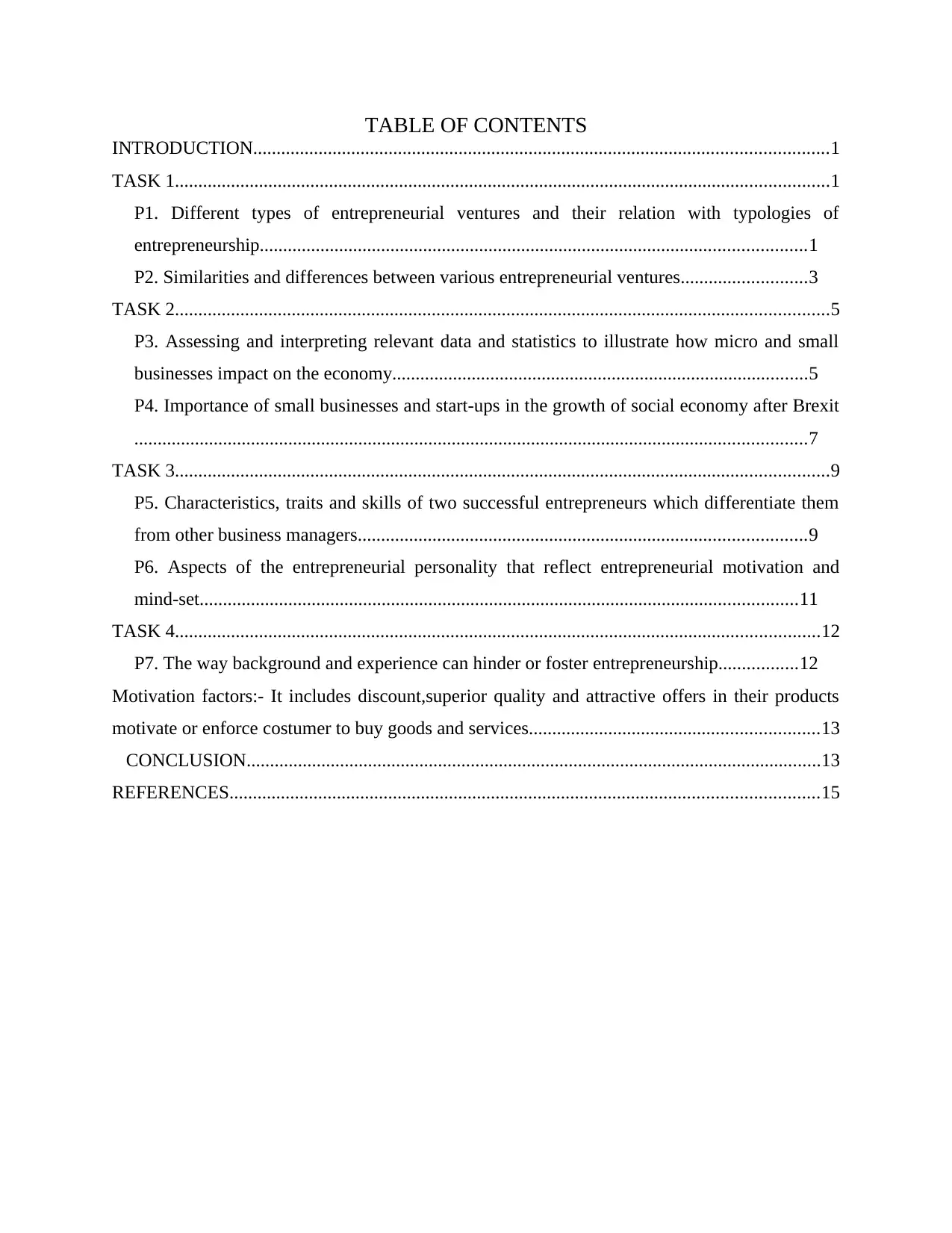
TABLE OF CONTENTS
INTRODUCTION...........................................................................................................................1
TASK 1............................................................................................................................................1
P1. Different types of entrepreneurial ventures and their relation with typologies of
entrepreneurship.....................................................................................................................1
P2. Similarities and differences between various entrepreneurial ventures...........................3
TASK 2............................................................................................................................................5
P3. Assessing and interpreting relevant data and statistics to illustrate how micro and small
businesses impact on the economy.........................................................................................5
P4. Importance of small businesses and start-ups in the growth of social economy after Brexit
................................................................................................................................................7
TASK 3............................................................................................................................................9
P5. Characteristics, traits and skills of two successful entrepreneurs which differentiate them
from other business managers................................................................................................9
P6. Aspects of the entrepreneurial personality that reflect entrepreneurial motivation and
mind-set................................................................................................................................11
TASK 4..........................................................................................................................................12
P7. The way background and experience can hinder or foster entrepreneurship.................12
Motivation factors:- It includes discount,superior quality and attractive offers in their products
motivate or enforce costumer to buy goods and services..............................................................13
CONCLUSION...........................................................................................................................13
REFERENCES..............................................................................................................................15
INTRODUCTION...........................................................................................................................1
TASK 1............................................................................................................................................1
P1. Different types of entrepreneurial ventures and their relation with typologies of
entrepreneurship.....................................................................................................................1
P2. Similarities and differences between various entrepreneurial ventures...........................3
TASK 2............................................................................................................................................5
P3. Assessing and interpreting relevant data and statistics to illustrate how micro and small
businesses impact on the economy.........................................................................................5
P4. Importance of small businesses and start-ups in the growth of social economy after Brexit
................................................................................................................................................7
TASK 3............................................................................................................................................9
P5. Characteristics, traits and skills of two successful entrepreneurs which differentiate them
from other business managers................................................................................................9
P6. Aspects of the entrepreneurial personality that reflect entrepreneurial motivation and
mind-set................................................................................................................................11
TASK 4..........................................................................................................................................12
P7. The way background and experience can hinder or foster entrepreneurship.................12
Motivation factors:- It includes discount,superior quality and attractive offers in their products
motivate or enforce costumer to buy goods and services..............................................................13
CONCLUSION...........................................................................................................................13
REFERENCES..............................................................................................................................15

⊘ This is a preview!⊘
Do you want full access?
Subscribe today to unlock all pages.

Trusted by 1+ million students worldwide
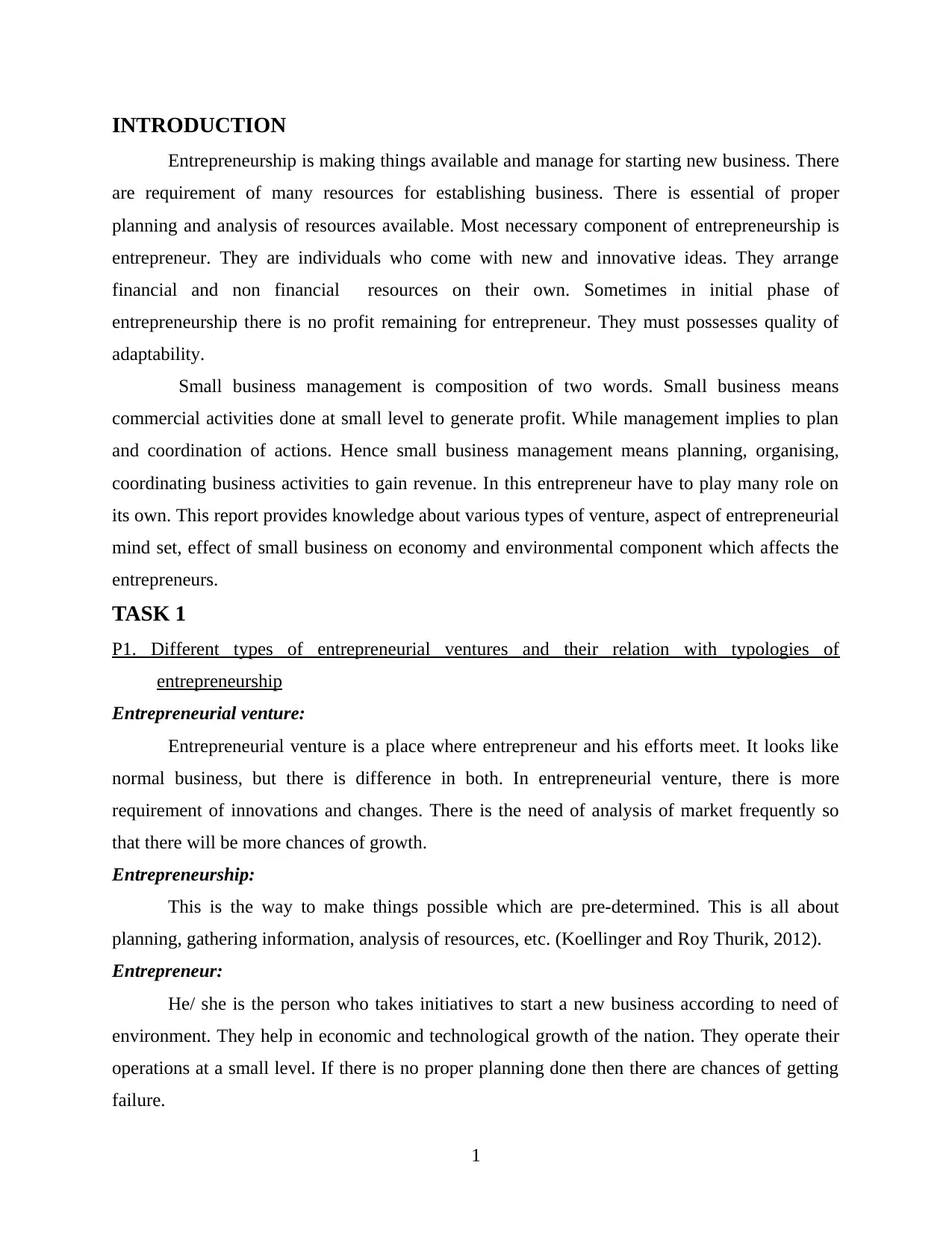
INTRODUCTION
Entrepreneurship is making things available and manage for starting new business. There
are requirement of many resources for establishing business. There is essential of proper
planning and analysis of resources available. Most necessary component of entrepreneurship is
entrepreneur. They are individuals who come with new and innovative ideas. They arrange
financial and non financial resources on their own. Sometimes in initial phase of
entrepreneurship there is no profit remaining for entrepreneur. They must possesses quality of
adaptability.
Small business management is composition of two words. Small business means
commercial activities done at small level to generate profit. While management implies to plan
and coordination of actions. Hence small business management means planning, organising,
coordinating business activities to gain revenue. In this entrepreneur have to play many role on
its own. This report provides knowledge about various types of venture, aspect of entrepreneurial
mind set, effect of small business on economy and environmental component which affects the
entrepreneurs.
TASK 1
P1. Different types of entrepreneurial ventures and their relation with typologies of
entrepreneurship
Entrepreneurial venture:
Entrepreneurial venture is a place where entrepreneur and his efforts meet. It looks like
normal business, but there is difference in both. In entrepreneurial venture, there is more
requirement of innovations and changes. There is the need of analysis of market frequently so
that there will be more chances of growth.
Entrepreneurship:
This is the way to make things possible which are pre-determined. This is all about
planning, gathering information, analysis of resources, etc. (Koellinger and Roy Thurik, 2012).
Entrepreneur:
He/ she is the person who takes initiatives to start a new business according to need of
environment. They help in economic and technological growth of the nation. They operate their
operations at a small level. If there is no proper planning done then there are chances of getting
failure.
1
Entrepreneurship is making things available and manage for starting new business. There
are requirement of many resources for establishing business. There is essential of proper
planning and analysis of resources available. Most necessary component of entrepreneurship is
entrepreneur. They are individuals who come with new and innovative ideas. They arrange
financial and non financial resources on their own. Sometimes in initial phase of
entrepreneurship there is no profit remaining for entrepreneur. They must possesses quality of
adaptability.
Small business management is composition of two words. Small business means
commercial activities done at small level to generate profit. While management implies to plan
and coordination of actions. Hence small business management means planning, organising,
coordinating business activities to gain revenue. In this entrepreneur have to play many role on
its own. This report provides knowledge about various types of venture, aspect of entrepreneurial
mind set, effect of small business on economy and environmental component which affects the
entrepreneurs.
TASK 1
P1. Different types of entrepreneurial ventures and their relation with typologies of
entrepreneurship
Entrepreneurial venture:
Entrepreneurial venture is a place where entrepreneur and his efforts meet. It looks like
normal business, but there is difference in both. In entrepreneurial venture, there is more
requirement of innovations and changes. There is the need of analysis of market frequently so
that there will be more chances of growth.
Entrepreneurship:
This is the way to make things possible which are pre-determined. This is all about
planning, gathering information, analysis of resources, etc. (Koellinger and Roy Thurik, 2012).
Entrepreneur:
He/ she is the person who takes initiatives to start a new business according to need of
environment. They help in economic and technological growth of the nation. They operate their
operations at a small level. If there is no proper planning done then there are chances of getting
failure.
1
Paraphrase This Document
Need a fresh take? Get an instant paraphrase of this document with our AI Paraphraser
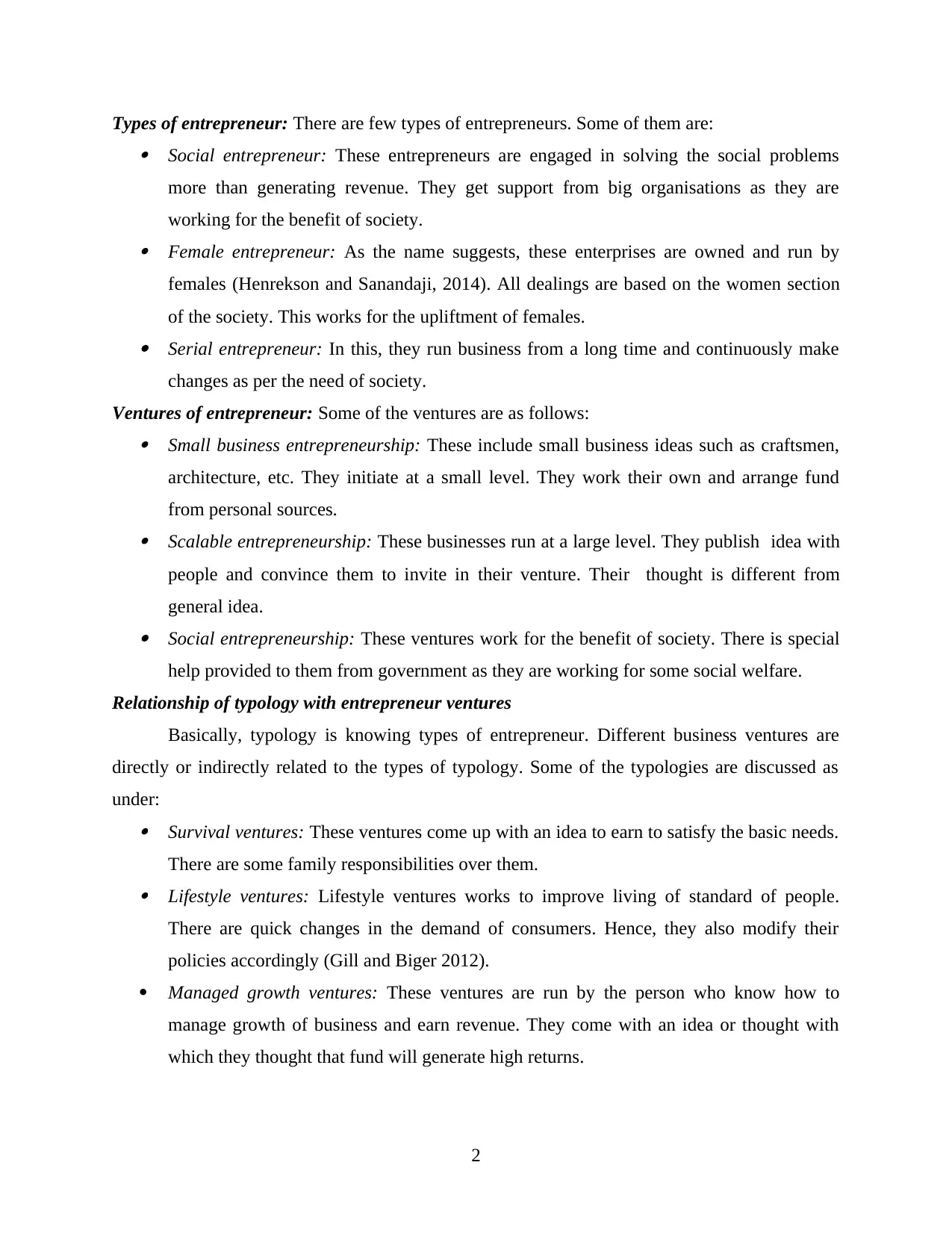
Types of entrepreneur: There are few types of entrepreneurs. Some of them are: Social entrepreneur: These entrepreneurs are engaged in solving the social problems
more than generating revenue. They get support from big organisations as they are
working for the benefit of society. Female entrepreneur: As the name suggests, these enterprises are owned and run by
females (Henrekson and Sanandaji, 2014). All dealings are based on the women section
of the society. This works for the upliftment of females. Serial entrepreneur: In this, they run business from a long time and continuously make
changes as per the need of society.
Ventures of entrepreneur: Some of the ventures are as follows: Small business entrepreneurship: These include small business ideas such as craftsmen,
architecture, etc. They initiate at a small level. They work their own and arrange fund
from personal sources. Scalable entrepreneurship: These businesses run at a large level. They publish idea with
people and convince them to invite in their venture. Their thought is different from
general idea. Social entrepreneurship: These ventures work for the benefit of society. There is special
help provided to them from government as they are working for some social welfare.
Relationship of typology with entrepreneur ventures
Basically, typology is knowing types of entrepreneur. Different business ventures are
directly or indirectly related to the types of typology. Some of the typologies are discussed as
under: Survival ventures: These ventures come up with an idea to earn to satisfy the basic needs.
There are some family responsibilities over them. Lifestyle ventures: Lifestyle ventures works to improve living of standard of people.
There are quick changes in the demand of consumers. Hence, they also modify their
policies accordingly (Gill and Biger 2012).
Managed growth ventures: These ventures are run by the person who know how to
manage growth of business and earn revenue. They come with an idea or thought with
which they thought that fund will generate high returns.
2
more than generating revenue. They get support from big organisations as they are
working for the benefit of society. Female entrepreneur: As the name suggests, these enterprises are owned and run by
females (Henrekson and Sanandaji, 2014). All dealings are based on the women section
of the society. This works for the upliftment of females. Serial entrepreneur: In this, they run business from a long time and continuously make
changes as per the need of society.
Ventures of entrepreneur: Some of the ventures are as follows: Small business entrepreneurship: These include small business ideas such as craftsmen,
architecture, etc. They initiate at a small level. They work their own and arrange fund
from personal sources. Scalable entrepreneurship: These businesses run at a large level. They publish idea with
people and convince them to invite in their venture. Their thought is different from
general idea. Social entrepreneurship: These ventures work for the benefit of society. There is special
help provided to them from government as they are working for some social welfare.
Relationship of typology with entrepreneur ventures
Basically, typology is knowing types of entrepreneur. Different business ventures are
directly or indirectly related to the types of typology. Some of the typologies are discussed as
under: Survival ventures: These ventures come up with an idea to earn to satisfy the basic needs.
There are some family responsibilities over them. Lifestyle ventures: Lifestyle ventures works to improve living of standard of people.
There are quick changes in the demand of consumers. Hence, they also modify their
policies accordingly (Gill and Biger 2012).
Managed growth ventures: These ventures are run by the person who know how to
manage growth of business and earn revenue. They come with an idea or thought with
which they thought that fund will generate high returns.
2
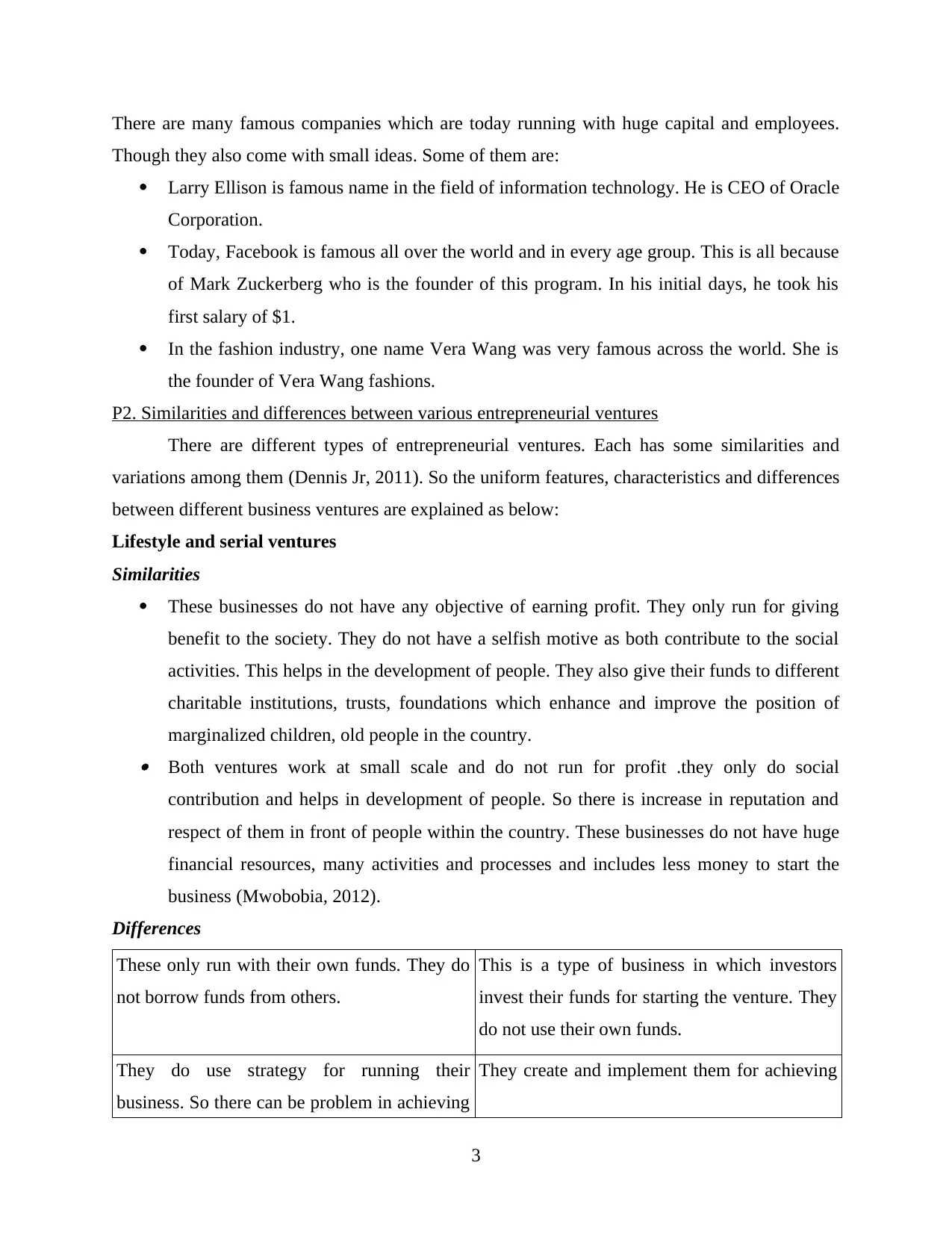
There are many famous companies which are today running with huge capital and employees.
Though they also come with small ideas. Some of them are:
Larry Ellison is famous name in the field of information technology. He is CEO of Oracle
Corporation.
Today, Facebook is famous all over the world and in every age group. This is all because
of Mark Zuckerberg who is the founder of this program. In his initial days, he took his
first salary of $1.
In the fashion industry, one name Vera Wang was very famous across the world. She is
the founder of Vera Wang fashions.
P2. Similarities and differences between various entrepreneurial ventures
There are different types of entrepreneurial ventures. Each has some similarities and
variations among them (Dennis Jr, 2011). So the uniform features, characteristics and differences
between different business ventures are explained as below:
Lifestyle and serial ventures
Similarities
These businesses do not have any objective of earning profit. They only run for giving
benefit to the society. They do not have a selfish motive as both contribute to the social
activities. This helps in the development of people. They also give their funds to different
charitable institutions, trusts, foundations which enhance and improve the position of
marginalized children, old people in the country. Both ventures work at small scale and do not run for profit .they only do social
contribution and helps in development of people. So there is increase in reputation and
respect of them in front of people within the country. These businesses do not have huge
financial resources, many activities and processes and includes less money to start the
business (Mwobobia, 2012).
Differences
These only run with their own funds. They do
not borrow funds from others.
This is a type of business in which investors
invest their funds for starting the venture. They
do not use their own funds.
They do use strategy for running their
business. So there can be problem in achieving
They create and implement them for achieving
3
Though they also come with small ideas. Some of them are:
Larry Ellison is famous name in the field of information technology. He is CEO of Oracle
Corporation.
Today, Facebook is famous all over the world and in every age group. This is all because
of Mark Zuckerberg who is the founder of this program. In his initial days, he took his
first salary of $1.
In the fashion industry, one name Vera Wang was very famous across the world. She is
the founder of Vera Wang fashions.
P2. Similarities and differences between various entrepreneurial ventures
There are different types of entrepreneurial ventures. Each has some similarities and
variations among them (Dennis Jr, 2011). So the uniform features, characteristics and differences
between different business ventures are explained as below:
Lifestyle and serial ventures
Similarities
These businesses do not have any objective of earning profit. They only run for giving
benefit to the society. They do not have a selfish motive as both contribute to the social
activities. This helps in the development of people. They also give their funds to different
charitable institutions, trusts, foundations which enhance and improve the position of
marginalized children, old people in the country. Both ventures work at small scale and do not run for profit .they only do social
contribution and helps in development of people. So there is increase in reputation and
respect of them in front of people within the country. These businesses do not have huge
financial resources, many activities and processes and includes less money to start the
business (Mwobobia, 2012).
Differences
These only run with their own funds. They do
not borrow funds from others.
This is a type of business in which investors
invest their funds for starting the venture. They
do not use their own funds.
They do use strategy for running their
business. So there can be problem in achieving
They create and implement them for achieving
3
⊘ This is a preview!⊘
Do you want full access?
Subscribe today to unlock all pages.

Trusted by 1+ million students worldwide
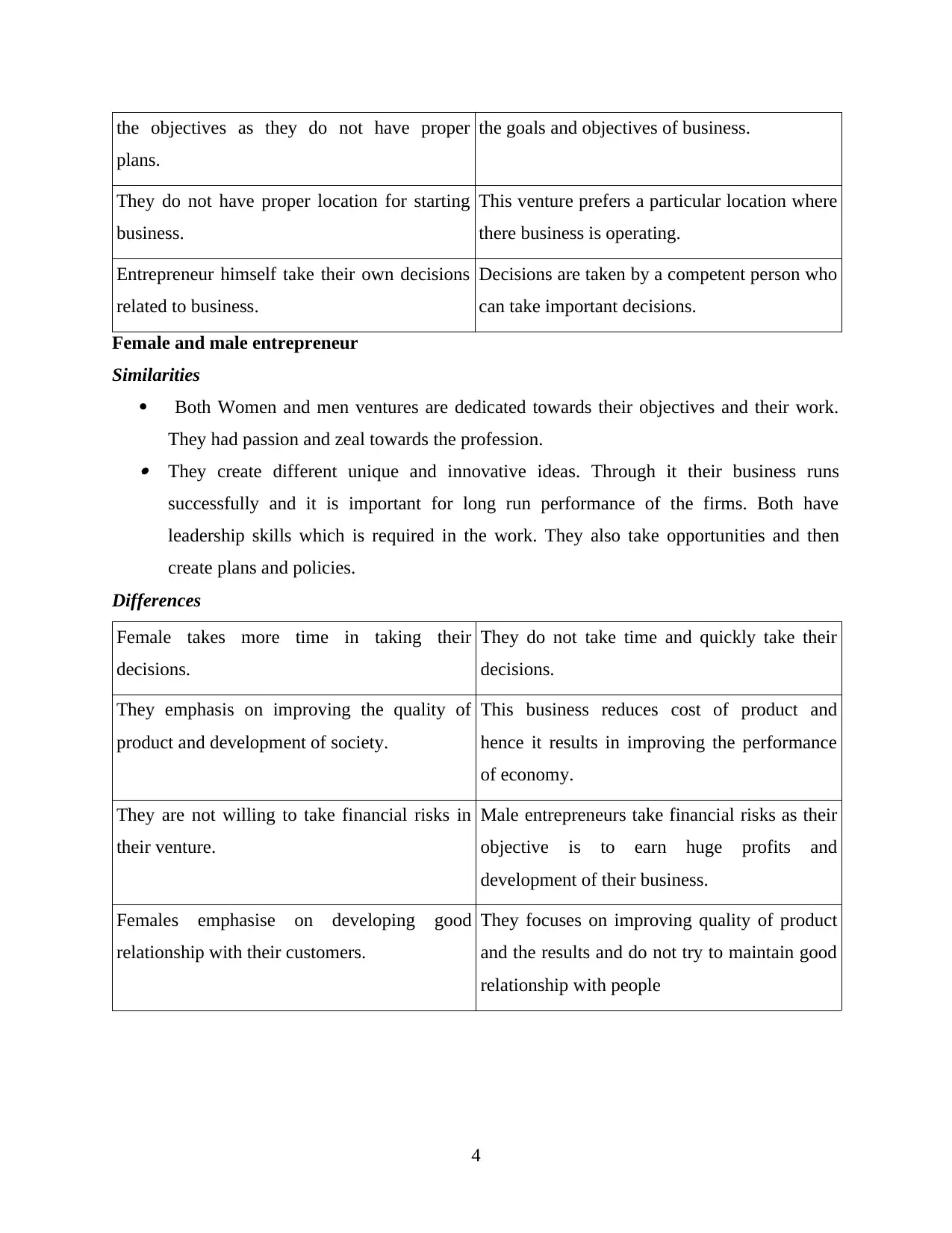
the objectives as they do not have proper
plans.
the goals and objectives of business.
They do not have proper location for starting
business.
This venture prefers a particular location where
there business is operating.
Entrepreneur himself take their own decisions
related to business.
Decisions are taken by a competent person who
can take important decisions.
Female and male entrepreneur
Similarities
Both Women and men ventures are dedicated towards their objectives and their work.
They had passion and zeal towards the profession. They create different unique and innovative ideas. Through it their business runs
successfully and it is important for long run performance of the firms. Both have
leadership skills which is required in the work. They also take opportunities and then
create plans and policies.
Differences
Female takes more time in taking their
decisions.
They do not take time and quickly take their
decisions.
They emphasis on improving the quality of
product and development of society.
This business reduces cost of product and
hence it results in improving the performance
of economy.
They are not willing to take financial risks in
their venture.
Male entrepreneurs take financial risks as their
objective is to earn huge profits and
development of their business.
Females emphasise on developing good
relationship with their customers.
They focuses on improving quality of product
and the results and do not try to maintain good
relationship with people
4
plans.
the goals and objectives of business.
They do not have proper location for starting
business.
This venture prefers a particular location where
there business is operating.
Entrepreneur himself take their own decisions
related to business.
Decisions are taken by a competent person who
can take important decisions.
Female and male entrepreneur
Similarities
Both Women and men ventures are dedicated towards their objectives and their work.
They had passion and zeal towards the profession. They create different unique and innovative ideas. Through it their business runs
successfully and it is important for long run performance of the firms. Both have
leadership skills which is required in the work. They also take opportunities and then
create plans and policies.
Differences
Female takes more time in taking their
decisions.
They do not take time and quickly take their
decisions.
They emphasis on improving the quality of
product and development of society.
This business reduces cost of product and
hence it results in improving the performance
of economy.
They are not willing to take financial risks in
their venture.
Male entrepreneurs take financial risks as their
objective is to earn huge profits and
development of their business.
Females emphasise on developing good
relationship with their customers.
They focuses on improving quality of product
and the results and do not try to maintain good
relationship with people
4
Paraphrase This Document
Need a fresh take? Get an instant paraphrase of this document with our AI Paraphraser
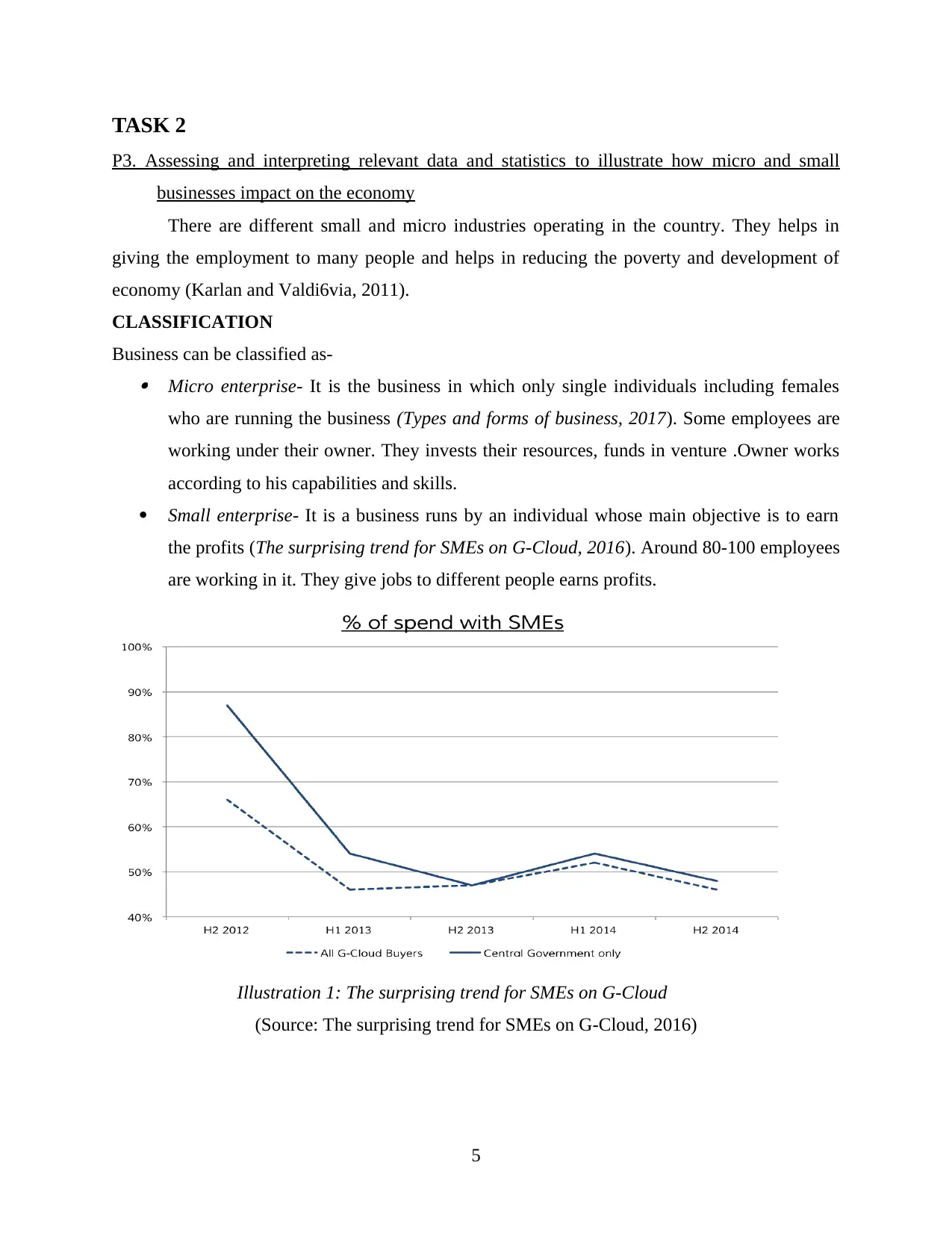
TASK 2
P3. Assessing and interpreting relevant data and statistics to illustrate how micro and small
businesses impact on the economy
There are different small and micro industries operating in the country. They helps in
giving the employment to many people and helps in reducing the poverty and development of
economy (Karlan and Valdi6via, 2011).
CLASSIFICATION
Business can be classified as- Micro enterprise- It is the business in which only single individuals including females
who are running the business (Types and forms of business, 2017). Some employees are
working under their owner. They invests their resources, funds in venture .Owner works
according to his capabilities and skills.
Small enterprise- It is a business runs by an individual whose main objective is to earn
the profits (The surprising trend for SMEs on G-Cloud, 2016). Around 80-100 employees
are working in it. They give jobs to different people earns profits.
Illustration 1: The surprising trend for SMEs on G-Cloud
(Source: The surprising trend for SMEs on G-Cloud, 2016)
5
P3. Assessing and interpreting relevant data and statistics to illustrate how micro and small
businesses impact on the economy
There are different small and micro industries operating in the country. They helps in
giving the employment to many people and helps in reducing the poverty and development of
economy (Karlan and Valdi6via, 2011).
CLASSIFICATION
Business can be classified as- Micro enterprise- It is the business in which only single individuals including females
who are running the business (Types and forms of business, 2017). Some employees are
working under their owner. They invests their resources, funds in venture .Owner works
according to his capabilities and skills.
Small enterprise- It is a business runs by an individual whose main objective is to earn
the profits (The surprising trend for SMEs on G-Cloud, 2016). Around 80-100 employees
are working in it. They give jobs to different people earns profits.
Illustration 1: The surprising trend for SMEs on G-Cloud
(Source: The surprising trend for SMEs on G-Cloud, 2016)
5
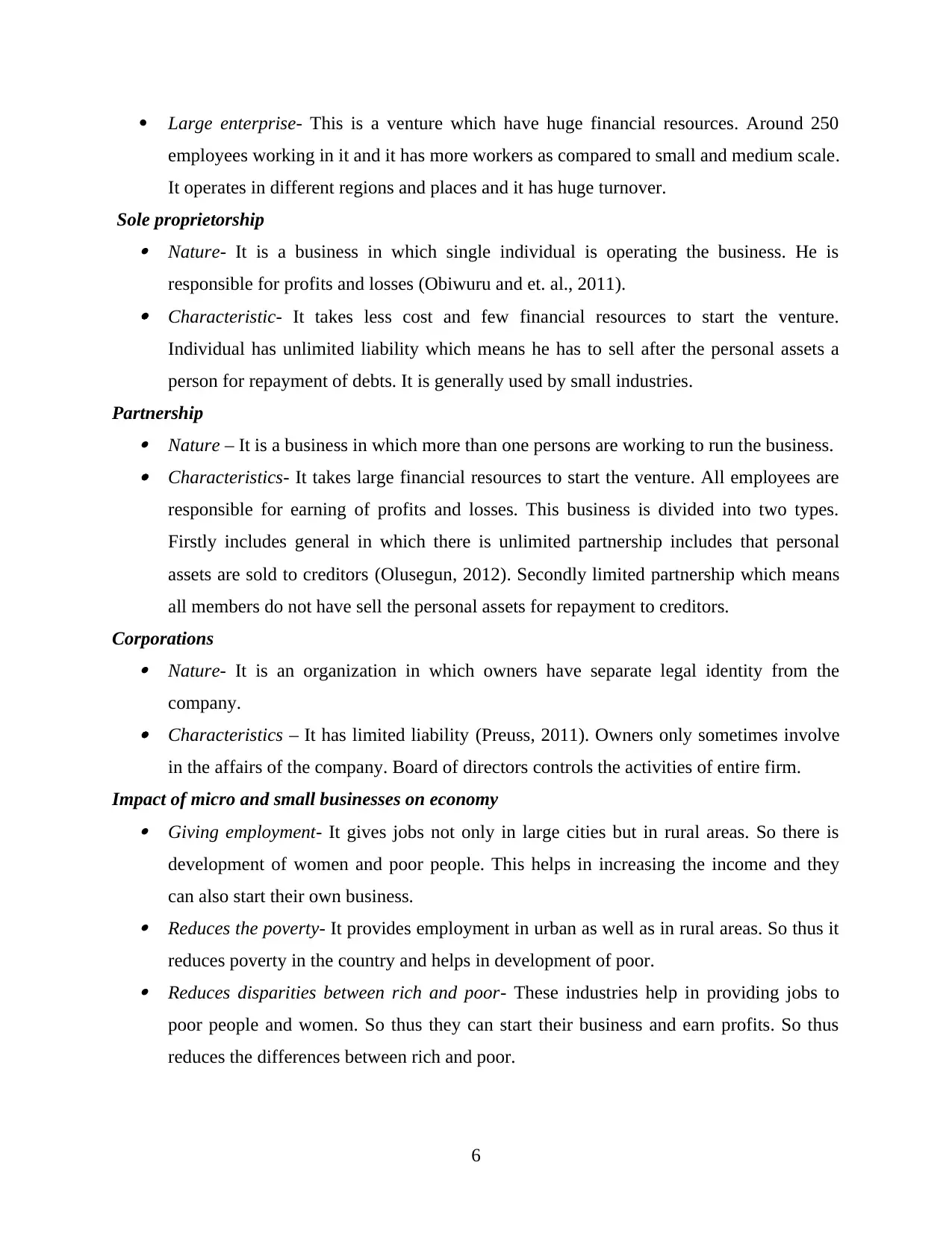
Large enterprise- This is a venture which have huge financial resources. Around 250
employees working in it and it has more workers as compared to small and medium scale.
It operates in different regions and places and it has huge turnover.
Sole proprietorship Nature- It is a business in which single individual is operating the business. He is
responsible for profits and losses (Obiwuru and et. al., 2011). Characteristic- It takes less cost and few financial resources to start the venture.
Individual has unlimited liability which means he has to sell after the personal assets a
person for repayment of debts. It is generally used by small industries.
Partnership Nature – It is a business in which more than one persons are working to run the business. Characteristics- It takes large financial resources to start the venture. All employees are
responsible for earning of profits and losses. This business is divided into two types.
Firstly includes general in which there is unlimited partnership includes that personal
assets are sold to creditors (Olusegun, 2012). Secondly limited partnership which means
all members do not have sell the personal assets for repayment to creditors.
Corporations Nature- It is an organization in which owners have separate legal identity from the
company. Characteristics – It has limited liability (Preuss, 2011). Owners only sometimes involve
in the affairs of the company. Board of directors controls the activities of entire firm.
Impact of micro and small businesses on economy Giving employment- It gives jobs not only in large cities but in rural areas. So there is
development of women and poor people. This helps in increasing the income and they
can also start their own business. Reduces the poverty- It provides employment in urban as well as in rural areas. So thus it
reduces poverty in the country and helps in development of poor. Reduces disparities between rich and poor- These industries help in providing jobs to
poor people and women. So thus they can start their business and earn profits. So thus
reduces the differences between rich and poor.
6
employees working in it and it has more workers as compared to small and medium scale.
It operates in different regions and places and it has huge turnover.
Sole proprietorship Nature- It is a business in which single individual is operating the business. He is
responsible for profits and losses (Obiwuru and et. al., 2011). Characteristic- It takes less cost and few financial resources to start the venture.
Individual has unlimited liability which means he has to sell after the personal assets a
person for repayment of debts. It is generally used by small industries.
Partnership Nature – It is a business in which more than one persons are working to run the business. Characteristics- It takes large financial resources to start the venture. All employees are
responsible for earning of profits and losses. This business is divided into two types.
Firstly includes general in which there is unlimited partnership includes that personal
assets are sold to creditors (Olusegun, 2012). Secondly limited partnership which means
all members do not have sell the personal assets for repayment to creditors.
Corporations Nature- It is an organization in which owners have separate legal identity from the
company. Characteristics – It has limited liability (Preuss, 2011). Owners only sometimes involve
in the affairs of the company. Board of directors controls the activities of entire firm.
Impact of micro and small businesses on economy Giving employment- It gives jobs not only in large cities but in rural areas. So there is
development of women and poor people. This helps in increasing the income and they
can also start their own business. Reduces the poverty- It provides employment in urban as well as in rural areas. So thus it
reduces poverty in the country and helps in development of poor. Reduces disparities between rich and poor- These industries help in providing jobs to
poor people and women. So thus they can start their business and earn profits. So thus
reduces the differences between rich and poor.
6
⊘ This is a preview!⊘
Do you want full access?
Subscribe today to unlock all pages.

Trusted by 1+ million students worldwide
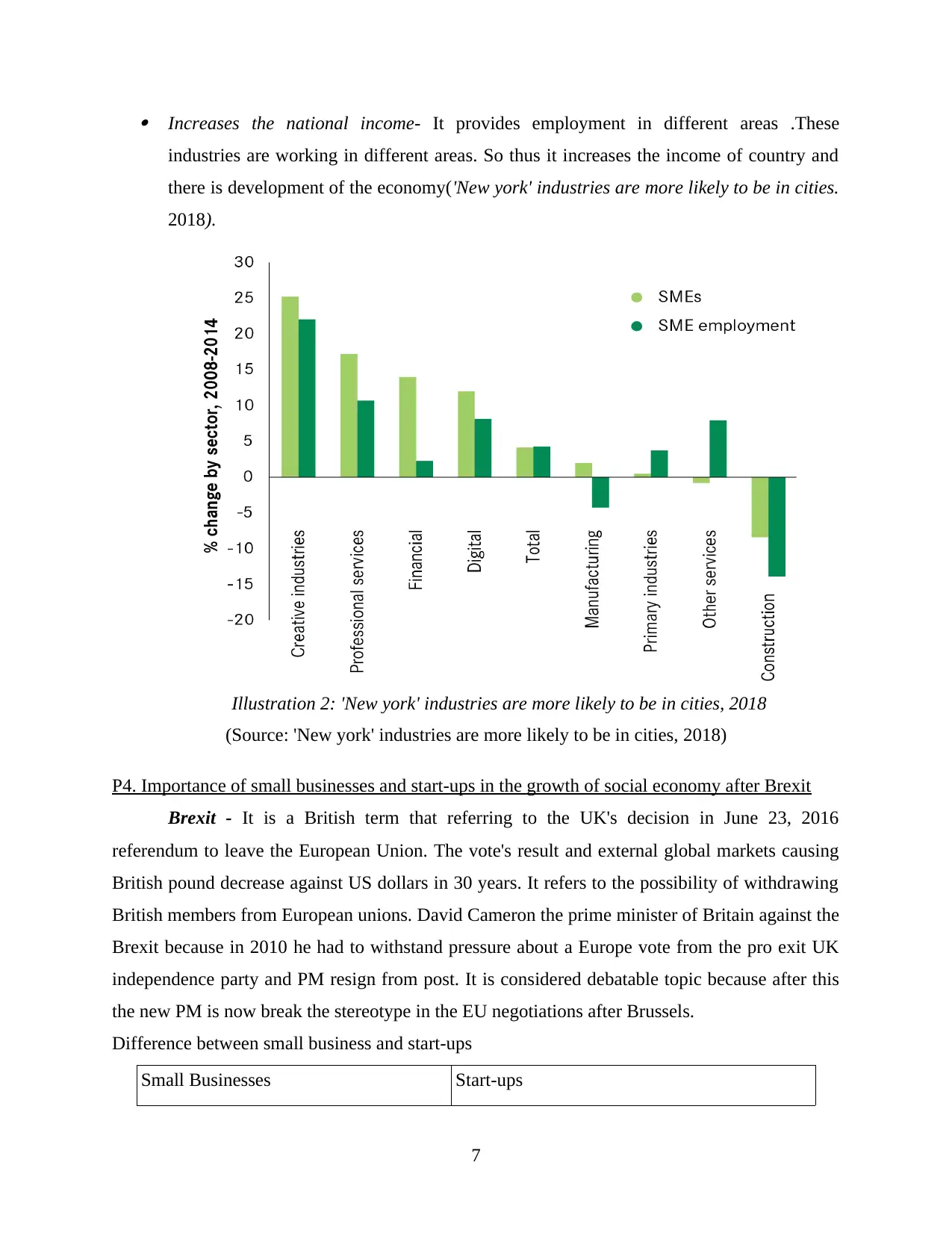
Increases the national income- It provides employment in different areas .These
industries are working in different areas. So thus it increases the income of country and
there is development of the economy('New york' industries are more likely to be in cities.
2018).
(Source: 'New york' industries are more likely to be in cities, 2018)
P4. Importance of small businesses and start-ups in the growth of social economy after Brexit
Brexit - It is a British term that referring to the UK's decision in June 23, 2016
referendum to leave the European Union. The vote's result and external global markets causing
British pound decrease against US dollars in 30 years. It refers to the possibility of withdrawing
British members from European unions. David Cameron the prime minister of Britain against the
Brexit because in 2010 he had to withstand pressure about a Europe vote from the pro exit UK
independence party and PM resign from post. It is considered debatable topic because after this
the new PM is now break the stereotype in the EU negotiations after Brussels.
Difference between small business and start-ups
Small Businesses Start-ups
7
Illustration 2: 'New york' industries are more likely to be in cities, 2018
industries are working in different areas. So thus it increases the income of country and
there is development of the economy('New york' industries are more likely to be in cities.
2018).
(Source: 'New york' industries are more likely to be in cities, 2018)
P4. Importance of small businesses and start-ups in the growth of social economy after Brexit
Brexit - It is a British term that referring to the UK's decision in June 23, 2016
referendum to leave the European Union. The vote's result and external global markets causing
British pound decrease against US dollars in 30 years. It refers to the possibility of withdrawing
British members from European unions. David Cameron the prime minister of Britain against the
Brexit because in 2010 he had to withstand pressure about a Europe vote from the pro exit UK
independence party and PM resign from post. It is considered debatable topic because after this
the new PM is now break the stereotype in the EU negotiations after Brussels.
Difference between small business and start-ups
Small Businesses Start-ups
7
Illustration 2: 'New york' industries are more likely to be in cities, 2018
Paraphrase This Document
Need a fresh take? Get an instant paraphrase of this document with our AI Paraphraser
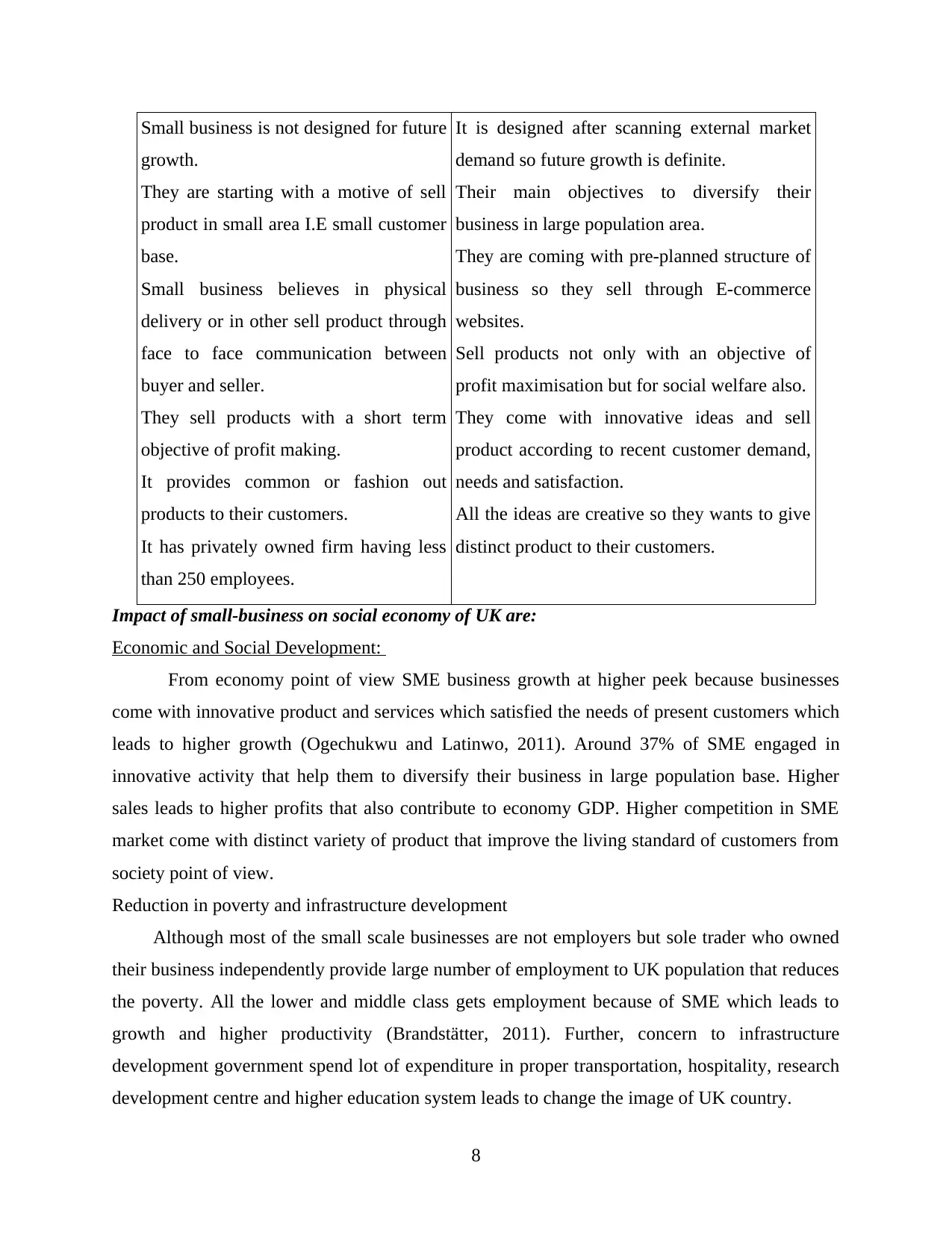
Small business is not designed for future
growth.
They are starting with a motive of sell
product in small area I.E small customer
base.
Small business believes in physical
delivery or in other sell product through
face to face communication between
buyer and seller.
They sell products with a short term
objective of profit making.
It provides common or fashion out
products to their customers.
It has privately owned firm having less
than 250 employees.
It is designed after scanning external market
demand so future growth is definite.
Their main objectives to diversify their
business in large population area.
They are coming with pre-planned structure of
business so they sell through E-commerce
websites.
Sell products not only with an objective of
profit maximisation but for social welfare also.
They come with innovative ideas and sell
product according to recent customer demand,
needs and satisfaction.
All the ideas are creative so they wants to give
distinct product to their customers.
Impact of small-business on social economy of UK are:
Economic and Social Development:
From economy point of view SME business growth at higher peek because businesses
come with innovative product and services which satisfied the needs of present customers which
leads to higher growth (Ogechukwu and Latinwo, 2011). Around 37% of SME engaged in
innovative activity that help them to diversify their business in large population base. Higher
sales leads to higher profits that also contribute to economy GDP. Higher competition in SME
market come with distinct variety of product that improve the living standard of customers from
society point of view.
Reduction in poverty and infrastructure development
Although most of the small scale businesses are not employers but sole trader who owned
their business independently provide large number of employment to UK population that reduces
the poverty. All the lower and middle class gets employment because of SME which leads to
growth and higher productivity (Brandstätter, 2011). Further, concern to infrastructure
development government spend lot of expenditure in proper transportation, hospitality, research
development centre and higher education system leads to change the image of UK country.
8
growth.
They are starting with a motive of sell
product in small area I.E small customer
base.
Small business believes in physical
delivery or in other sell product through
face to face communication between
buyer and seller.
They sell products with a short term
objective of profit making.
It provides common or fashion out
products to their customers.
It has privately owned firm having less
than 250 employees.
It is designed after scanning external market
demand so future growth is definite.
Their main objectives to diversify their
business in large population area.
They are coming with pre-planned structure of
business so they sell through E-commerce
websites.
Sell products not only with an objective of
profit maximisation but for social welfare also.
They come with innovative ideas and sell
product according to recent customer demand,
needs and satisfaction.
All the ideas are creative so they wants to give
distinct product to their customers.
Impact of small-business on social economy of UK are:
Economic and Social Development:
From economy point of view SME business growth at higher peek because businesses
come with innovative product and services which satisfied the needs of present customers which
leads to higher growth (Ogechukwu and Latinwo, 2011). Around 37% of SME engaged in
innovative activity that help them to diversify their business in large population base. Higher
sales leads to higher profits that also contribute to economy GDP. Higher competition in SME
market come with distinct variety of product that improve the living standard of customers from
society point of view.
Reduction in poverty and infrastructure development
Although most of the small scale businesses are not employers but sole trader who owned
their business independently provide large number of employment to UK population that reduces
the poverty. All the lower and middle class gets employment because of SME which leads to
growth and higher productivity (Brandstätter, 2011). Further, concern to infrastructure
development government spend lot of expenditure in proper transportation, hospitality, research
development centre and higher education system leads to change the image of UK country.
8
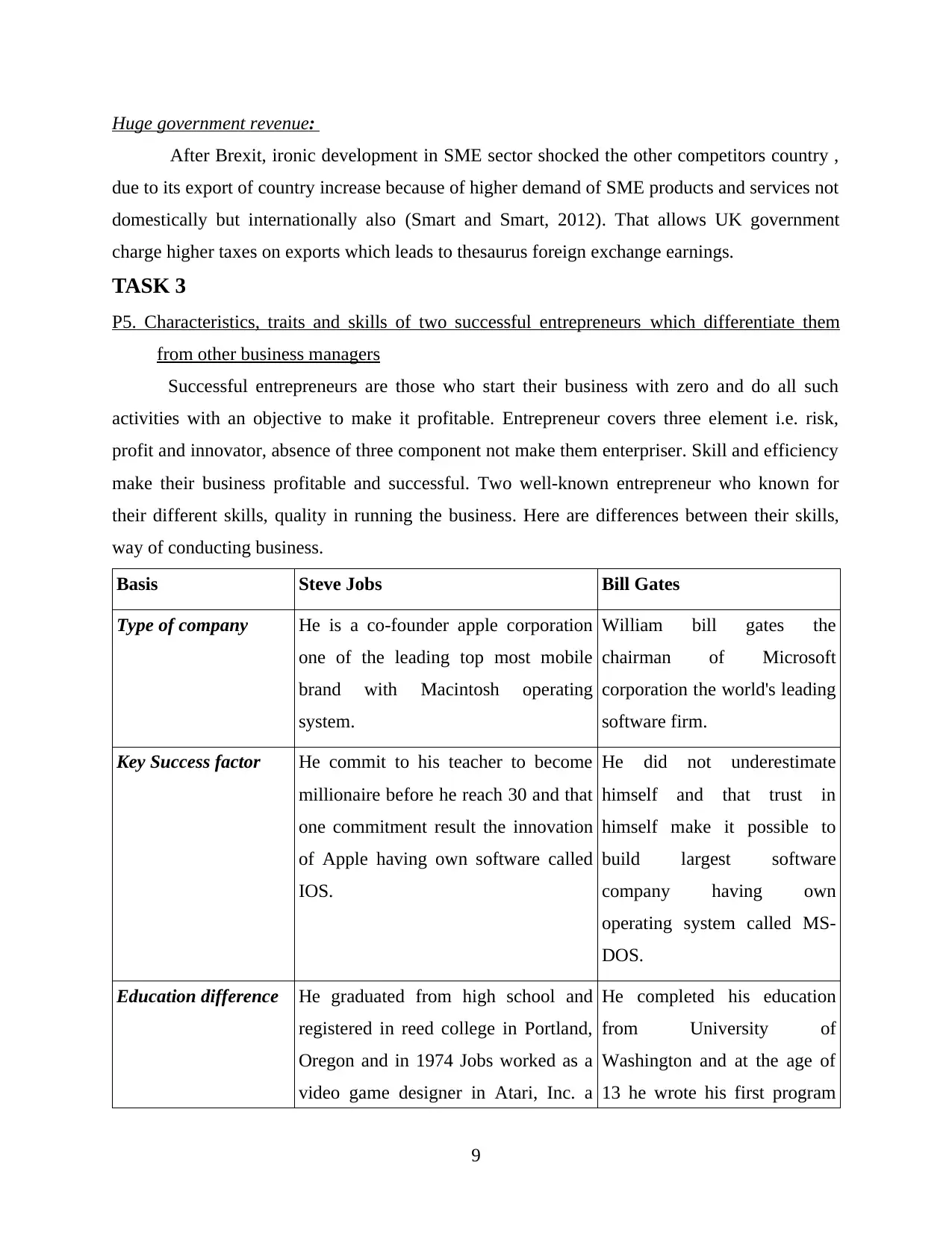
Huge government revenue:
After Brexit, ironic development in SME sector shocked the other competitors country ,
due to its export of country increase because of higher demand of SME products and services not
domestically but internationally also (Smart and Smart, 2012). That allows UK government
charge higher taxes on exports which leads to thesaurus foreign exchange earnings.
TASK 3
P5. Characteristics, traits and skills of two successful entrepreneurs which differentiate them
from other business managers
Successful entrepreneurs are those who start their business with zero and do all such
activities with an objective to make it profitable. Entrepreneur covers three element i.e. risk,
profit and innovator, absence of three component not make them enterpriser. Skill and efficiency
make their business profitable and successful. Two well-known entrepreneur who known for
their different skills, quality in running the business. Here are differences between their skills,
way of conducting business.
Basis Steve Jobs Bill Gates
Type of company He is a co-founder apple corporation
one of the leading top most mobile
brand with Macintosh operating
system.
William bill gates the
chairman of Microsoft
corporation the world's leading
software firm.
Key Success factor He commit to his teacher to become
millionaire before he reach 30 and that
one commitment result the innovation
of Apple having own software called
IOS.
He did not underestimate
himself and that trust in
himself make it possible to
build largest software
company having own
operating system called MS-
DOS.
Education difference He graduated from high school and
registered in reed college in Portland,
Oregon and in 1974 Jobs worked as a
video game designer in Atari, Inc. a
He completed his education
from University of
Washington and at the age of
13 he wrote his first program
9
After Brexit, ironic development in SME sector shocked the other competitors country ,
due to its export of country increase because of higher demand of SME products and services not
domestically but internationally also (Smart and Smart, 2012). That allows UK government
charge higher taxes on exports which leads to thesaurus foreign exchange earnings.
TASK 3
P5. Characteristics, traits and skills of two successful entrepreneurs which differentiate them
from other business managers
Successful entrepreneurs are those who start their business with zero and do all such
activities with an objective to make it profitable. Entrepreneur covers three element i.e. risk,
profit and innovator, absence of three component not make them enterpriser. Skill and efficiency
make their business profitable and successful. Two well-known entrepreneur who known for
their different skills, quality in running the business. Here are differences between their skills,
way of conducting business.
Basis Steve Jobs Bill Gates
Type of company He is a co-founder apple corporation
one of the leading top most mobile
brand with Macintosh operating
system.
William bill gates the
chairman of Microsoft
corporation the world's leading
software firm.
Key Success factor He commit to his teacher to become
millionaire before he reach 30 and that
one commitment result the innovation
of Apple having own software called
IOS.
He did not underestimate
himself and that trust in
himself make it possible to
build largest software
company having own
operating system called MS-
DOS.
Education difference He graduated from high school and
registered in reed college in Portland,
Oregon and in 1974 Jobs worked as a
video game designer in Atari, Inc. a
He completed his education
from University of
Washington and at the age of
13 he wrote his first program
9
⊘ This is a preview!⊘
Do you want full access?
Subscribe today to unlock all pages.

Trusted by 1+ million students worldwide
1 out of 19
Related Documents
Your All-in-One AI-Powered Toolkit for Academic Success.
+13062052269
info@desklib.com
Available 24*7 on WhatsApp / Email
![[object Object]](/_next/static/media/star-bottom.7253800d.svg)
Unlock your academic potential
Copyright © 2020–2026 A2Z Services. All Rights Reserved. Developed and managed by ZUCOL.




